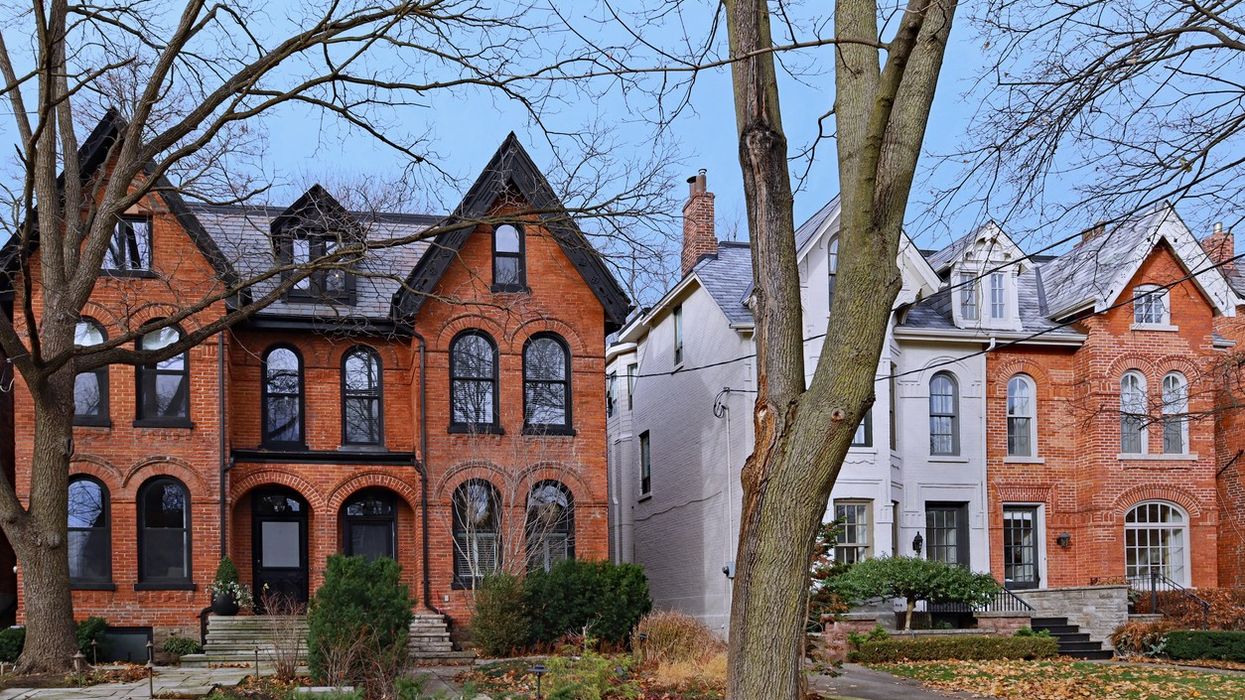"Normally, I'm planning vacations around now," Toronto realtor Susan Gucci told STOREYS in late-November. Instead, during a season where the housing market typically takes a back seat to holiday planning and frigid weather, Gucci is servicing clients who have been eagerly waiting to take advantage of lowering rates. "It feels like they just woke up," she says.
Gucci's firsthand experience is reflective of what the data has been showing us over the last two months: buyers are returning to the market in mentionable numbers after months of unmentionable numbers led organizations like the Toronto Regional Real Estate Board (TRREB) and the Canadian Real Estate Association (CREA) to opt for looking to the future rather than focusing on the present. "Expect sales to accelerate as buyers benefit from lower monthly mortgage payments," TRREB's President Jennifer Pearce was already saying back in a dismal July.
Finally, it seems that the future the market has been waiting for may have actually arrived. Due to rate cuts and relatively stagnant prices, GTA homes sales increased 44% year-over-year in October, followed by a 40% increase in November. Meanwhile, the average selling price ticked up 2.6% compared to November 2023.
But what can we expect moving forward? Is the growth sustainable? What will sell? Who will buy? Where will prices go? In pursuit of answering these questions, STOREYS spoke to industry experts and insiders about what to expect in 2025.
Primed Economic Climate (Despite "Vibecession")
As we ring in the new year, homebuyers and sellers will be operating within a much different economic environment than we saw at the beginning of 2024.
Interest rates have dropped 1.75 bps since July to 3.25% (thanks to another 50-bp cut just this week), inflation has returned to 2% from 2.9% in January, and though the unemployment rate has gradually risen to 6.8%, it's not expected to worsen over the course of 2025, Senior Economist at BMO Robert Kavcic tells STOREYS.
“We’re actually expecting growth to pick up a bit next year," Kavcic says. "On the inflation front, we’re back to where we need to be [...] so the Bank of Canada (BoC) can go ahead and cut rates if they feel they need to, which is good for housing."
At the same time, Kavcic acknowledges that we're in the midst of an affordability crisis. "The reality is that valuations got so stretched the last couple years that even though prices have come down and interest rates have come down it's still not, quote unquote, 'affordable' for a lot of people," he says.

In November, Deputy Prime Minister Chrystia Freeland addressed a Canadian morale phenomenon coined the "Vibecession," where despite economically encouraging stats like the ones Kavcic mentions, Canadians don't feel like things are improving. The phenomenon is telling of just how expensive everyday life has become for the average Canadian post-pandemic. As Kavcic puts it, "Grocery price inflation is back to zero, which is great, but the cost of that bag you walk out of Loblaws with isn't actually lower, it's still way higher than it would have been a few years ago."
This general sense of a lack of affordability is, in part, dissuading younger and lower-income Canadians from entering the housing market. But for those with the resources and the right amount of built-up angst, recent data shows conditions have softened enough for them to stop standing on the sidelines — conditions which are projected to further improve over the course of 2025.
Sales Expected to Increase
TRREB's Chief Market Analyst Jason Mercer tells STOREYS that the sales numbers we've been seeing since the fall are only expected to increase come spring 2025. "It's really going to be in the spring when we see interest rates get to the point where it’s affordable for the average household in the GTA and Toronto to get back into the marketplace," says Mercer. "We'll certainly see a lot more transactions relative to what we saw in the spring of 2024."
Driving this demand is, of course, lower borrowing costs, but also a healthy supply of inventory that has helped keep prices from increasing. But this dynamic could be thrown off, Mercer says, as we approach the end of the year and begin looking into 2026, if supply isn't sustained.
"If we’re not seeing that new supply come down the pipeline we're going to get into a scenario where market conditions really tighten up again," he says. "What we want to see is a sustainable growth [...] rather than the whipsaws we've seen over the past decade where there’s not enough supply to meet demand, and we start to see high single digit or even double digit price growth on units."
Prices Increases Will Depend On Product
While demand is on the rise, Mercer points out that some unit types will move faster than others, impacting pricing as well. Notably, single-family homes are already seeing an increase in demand, while condos continue to be the pariahs of the Toronto housing market — something Gucci has noted as well.
In mid-November, Gucci was representing a buyer in a multiple offers situation for a small Leslieville semi-detached listed at $1,249,000. It ended up selling for $1,812,000, a price Gucci called "incredible." Gucci explained that because that kind of product was limited in the area and because the home was nicely-renovated and well-staged, it was able to garner around 20 offers.

But she couldn't say the same for her condo listings. "The condo market is tough because there’s so much of them out there and they're just sitting. It’s an inventory issue," she says. It is an inventory issue. In fact, in October, Urbanation President Shaun Hildebrand estimated that the GTA is currently grappling with almost 40,000 units of condo supply – a near record high.
The result is that prices for single-family homes, which are more coveted and less plentiful, will see price increases first, while condos prices will remain stagnant, at first. "On the condo apartment side we’ve seen a real run up in inventory and so it will take a little bit longer for that inventory to be absorbed, and once it is, probably more so as we move towards 2026, we might start to see some upwards pressure on that front as well," Mercer says.
But though prices on some units are expected to increase as supply gets eaten up, Kavcic cautions against underestimating the housing affordability crisis. "There’s only so much room for prices to rise because we’re still dealing with valuations that got so out of whack with fundamentals the last few years," he says. "I would say [prices] will be flat to slightly higher over the spring and over the course of the year."
Kavcic highlights the fact that the cash flow dynamics for investors are similarly "out of whack," and that they will likely have to wait until rates drop considerably lower before re-entering the market.
First-Time Homebuyers To Hop Off Left Bench
While investors are out for the count, well-positioned first-time homebuyers have been projected to drive a significant amount of sales come 2025.
In their 2025 Housing Market Outlook Report, RE/MAX Canada reported that their brokers and agents in 81% of regions surveyed noted that "first-time homebuyers were the key demographic anticipated to drive market activity in 2025."
Toronto-based realtor with Royal LePage, Jennifer Dernek, tells STOREYS this is a trend she sees playing out as well. "I would agree the first-time buyers are going to make up a lot of the purchases next year because they haven't really been active in the last couple of years when they just couldn't afford to get into the market with the rates at what they were," says Dernek. "I think they're eager."
Dernek also points out that the recent mortgage reforms set to take hold next week will make homeownership even more attainable for first-time buyers as well as expand their buying options. These include the expansion of eligibility for 30-year amortizations on insured mortgages to include all first-time homebuyers and to all purchasers of new construction properties, and an increase of the the mortgage insurance cap from $1 million to $1.5 million.
"First-time homebuyers are looking at other options now over condos and seeing if they can buy a townhouse or a semi-detached or a home," says Dernek. "Because of the new rules they have a better chance of getting into them."
- GTA Condo Supply Is Approaching A Number “The Market Has Never Seen” ›
- Feds Introduce Two Substantial New Mortgage Reforms ›
- "A Return To Stability": Royal LePage Releases 2025 Home Price Forecast ›
- What Ontario's Cottage Market Could Look Like In 2025 ›
- Sotheby's "Optimistic" For Luxury Markets After "Tumultuous" 2024 ›
- TD Calls For Further 10% Drop In GTA Condo Prices This Year ›





















